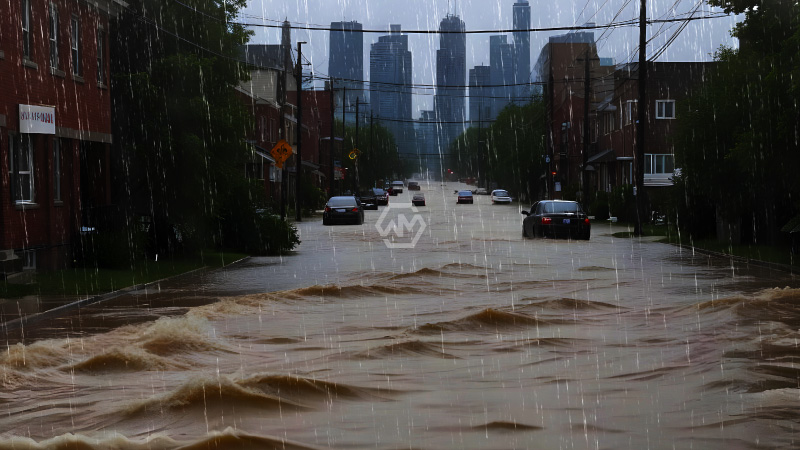- Toronto was hit by record-breaking rainfall, surpassing a daily record set in 1941.
- Severe flooding across the city leads to power outages affecting over 167,000 customers.
- Major motorways and transportation hubs like Union Station were impacted; rescue efforts are underway.
Toronto is reeling from the aftermath of three consecutive storms that dumped nearly 100mm of rain on the city in a single day, eclipsing historical records. The deluge led to widespread flooding, with images and videos showing submerged cars, inundated homes, and water pouring through Union Station.
Meteorologists attribute the intensity of the storms to unusual weather patterns, delivering in a few hours what Toronto typically sees in an entire month of July.
“Toronto’s Infrastructure Tested: Coping with Record Rainfall and Flood Devastation”
The recent torrential rains in Toronto have brought unprecedented challenges to the city’s infrastructure and residents. Record-breaking rainfall exceeding 100mm flooded streets, homes, and major highways like the Don Valley Parkway, paralyzing transportation and causing power outages affecting over 167,000 people. The scenes of submerged vehicles and water cascading through Union Station highlighted the severity of the situation, prompting swift rescue operations by emergency services.
Mayor Olivia Chow expressed concern over the management of the crisis, questioning why preemptive measures weren’t taken earlier to mitigate the impact on critical infrastructure like the Don Valley Parkway, known for its susceptibility to flooding. Despite investments in flood control measures, the city faced significant disruptions, with flights delayed, roads closed, and residents stranded in affected areas. The storm’s intensity, attributed to unusual weather patterns, underscores the growing challenges of climate change adaptation and urban resilience in cities like Toronto.
Efforts are now focused on cleanup and recovery, with assurances from city officials of ongoing investments to bolster infrastructure against future weather extremes. The Toronto and Region Conservation Authority has issued warnings about ongoing flood risks, particularly in low-lying areas near rivers and streams. As Toronto grapples with the aftermath, the resilience of its infrastructure and preparedness for future climate-related events will be crucial in safeguarding the city and its residents.
The recent flooding in Toronto serves as a stark reminder of the vulnerability of urban centers to extreme weather events amplified by climate change. As the city continues its recovery efforts and evaluates its response to the crisis, proactive measures in infrastructure investment and emergency planning will be key to building resilience and ensuring the safety of its residents in the face of future challenges.



